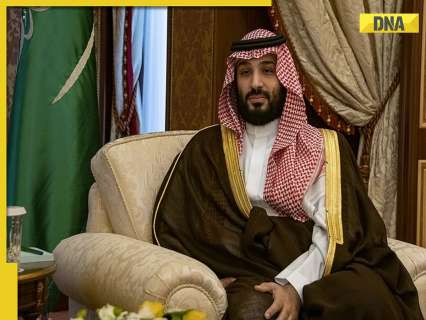
The recent wave of diplomatic talks and meetings between long-time rivals Saudi Arabia and Iran suggests a shift in Riyadh’s approach to regional politics. This comes amid rising regional tensions and efforts by the new US president to bring an end to the ongoing conflicts involving Israel in Gaza and Lebanon. Saudi Arabia’s top military leader, Chief of Staff General Fayyad al-Ruwaili, held talks with Iran’s Major-General Mohammed Bagheri in Tehran on Sunday (November 10).
During their meeting, they focussed on ways to strengthen defence cooperation between the two countries. Although this may suggest closer ties between Saudi Arabia and Iran, the two experts believe the situation is more complex than it appears. During their meeting, Ruwaili and Bagheri talked about ways to strengthen military and defence cooperation between Saudi Arabia and Iran to support security and stability in the region.
This was stated by Saudi Arabia’s Ministry of Defence on Sunday, with Iran’s state-run news agency Islamic Republic News Agency (IRNA) confirming the details. Only a few hours after the Ruwaili-Bagheri meeting, Saudi Crown Prince Mohammed-bin-Salman spoke to Iranian President Masoud Pezeshkian over the phone. They discussed the relationship between Tehran and Riyadh, as well as a summit held in Riyadh on Monday, attended by the crown prince, Iran’s First Vice-President Mohammed Reza Aref and other regional leaders.
As reported by IRNA, Crown Prince Mohammed stated during the call that relations between Iran and Saudi Arabia had reached a “historic turning point”. He also repeated his invitation for President Pezeshkian to visit Saudi Arabia. At the Riyadh summit held on Monday, which focussed on supporting a two-state solution for Israel and Palestine, the crown prince urged Israel to “respect the sovereignty of the friendly Islamic Republic of Iran and refrain from violating its territory”.
He spoke about Israel’s attacks on Lebanon and Iran, but made no mention of their own attacks on Israel. Riyadh and Tehran re-established diplomatic ties in March 2023 through a deal brokered by China, ending a six-year period of no formal relations. The recent events built on Saudi Arabia’s announcement last month that it had conducted joint naval exercises with Iran and other nations in the Sea of Oman.
In early-October, Iran’s Foreign Minister, Abbas Araghchi, visited Riyadh for the first time since taking office in August. He met Crown Prince Mohammed and Saudi Foreign Minister Prince Faisal-bin-Farhan Al-Saud. Is the progress only Temporary? Gregory Brew, a senior analyst at the Eurasia Group focusing on Iran, oil and US foreign policy, told Al-Monitor that, although recent Saudi-Iran interactions might seem promising, the closer ties were, possibly, a reaction to current regional conditions and might not be long-lasting.
Brew believes Iran and Saudi Arabia are brought together by a ‘common worry’ that the ongoing violence in Gaza, Lebanon and between Iran and Israel could threaten Gulf security, especially the safe flow of oil through the region. According to Brew, Iran is concerned about risks to its oil exports, while Saudi Arabia wonders if Iran and its allies may target regional energy facilities, as they did in 2019 and 2020, if Iran’s oil exports are disrupted. Brew believes the current regional crisis has brought Saudi Arabia and Iran closer together in terms of their short-term interests.
However, in the long run, Riyadh and Tehran still see each other as rivals and competitors. Brew suggested China could be a key factor in bringing Saudi Arabia and Iran together for the long term. However, although China brokered the 2023 agreement between Riyadh and Tehran, it has not shown any interest in acting as a diplomatic link between the two nations since then.
China is crucial for both Saudi Arabia and Iran. But, unless it steps up its involvement in the region, there is little that could bring the two countries closer beyond their short-term goal of securing Gulf stability. Expanding communication channels As reported by Al-Monitor, Sanam Vakil, head of the Middle East and North Africa Program at Chatham House and an adjunct professor at Johns Hopkins School of Advanced International Studies, believe there is potential for lasting progress between Saudi Arabia and Iran.
While Vakil agrees with some of Brew’s doubts about the recent closeness between Saudi Arabia and Iran, she sees the recent meeting between their military leaders as a positive step. She believes both sides were working to establish more ways to communicate and cooperate. Interestingly, despite the ongoing, interconnected conflicts in the region linked to Iran’s destabilizing influence, the relationship between Saudi Arabia and Iran is still progressing.
This suggests a shift towards prioritizing de-escalation, along with a practical approach that both sides are bringing to their interactions. Vakil views the current relationship as “a practical move to handle tensions and challenges”. However, she also thinks it has the potential to develop into something stronger.
Vakil explained to Al-Monitor that the challenges Saudi Arabia and Iran face in building a relationship were “structural” and went beyond just the two countries. She noted that obstacles were largely due to influences from Israel and Washington. Looking at the future of Saudi-Iran relations, Vakil commented that lasting change would be difficult until other key players adjusted their policies, too.
She mentioned examples, such as Iran aiding Saudi Arabia in managing the Houthis, a reduction in US-Iran tensions and a de-escalation of Israel’s conflicts in Gaza, Lebanon and with Iran. (The author of this article is a Defence, Aerospace & Political Analyst based in Bengaluru. He is also Director of ADD Engineering Components, India, Pvt.
Ltd, a subsidiary of ADD Engineering GmbH, Germany. You can reach him at: [email protected]) (Disclaimer: The views expressed above are the author's own and do not reflect those of DNA).














